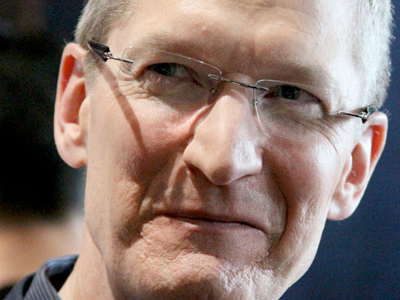As the two rivals meet in court to discuss Apple's $1 billion+ court case win against Samsung in August, the Apple CEO has, in his first major interview since becoming head honcho, discussed the relationship between both technology giants, the tablet market, as well as the firm's vision for the integration of wireless components into its products.
Cook firstly discussed the situation surrounding the departure of iOS' chief Scott Forstall and retail head John Browett. The former, who won't leave his position for good until 2013, was allegedly sacked due to not signing an apology to iOS users regarding 'Mapplegate', ultimately leading to Cook issuing an apology.
The move was intended to take Apple where it needs to go, Cook told Bloomberg. "The key in the change that you're referencing is my deep belief that collaboration is essential for innovation - and I didn't just start believing that."
"So the changes - it's not a matter of going from no collaboration to collaboration. We have an enormous level of collaboration in Apple, but it's a matter of taking it to another level."
Cook's Q&A also saw the CEO discussing Apple's wireless plans, which is a goal it can't apparently meet without the participation of new Senior Vice President of Technologies Bob Mansfield, who initially wanted to retire from his post until Cook offered a $2 million monthly pay package.
"We've got some really cool ideas, some very ambitious plans in this area," Cook revealed. "And so it places him leading all of that."
Samsung is one of Apple's most crucial suppliers as it's the only firm who can meet production demands within a given timeframe, but it's also the iPhone maker's fierce competitor with the two locked in over 10 patent disputes over the globe. That relationship is uncomfortable, Cook stressed.
Get Tom's Hardware's best news and in-depth reviews, straight to your inbox.
"Life is a complex thing somethings, and yes, it's awkward," he acknowledged. "It is awkward. I hate litigation. I absolutely hate it."
Why would Apple continue its business relationship with Samsung, then? "For us, this is about values. What we would like, in a perfect world, is for everyone to invent their own stuff. We love competition. But we want people to have their own ideas and invent their own stuff. So after lots of trying, we felt we had no other choice."
Cook was also directly asked about what sets Apple's tablet strategy apart from Samsung and Microsoft's. "Again, if you look at our North Star, we're focused on making the best products, so ours is very product-centric," he said. "We're also marrying hardware, software and services.
"If you think about Android, it's more like the Windows PC model. The operating system comes from company A. Company B is doing some integration work, and maybe the services come from yet somewhere else. I think we know the kind of customer experience that produces."
Cook has tested Microsoft's Surface, an unspecified Galaxy device and other non-iOS products, with his experience not being the best. "[Some] of these are confusing, multiple OSs with multiple UIs.They steer away from simplicity. We think the customer wants all the clutter removed."
So what does Apple offer to deliver a more compelling experience than its competitors' tablets? Tablet-optimized apps is one reason, he noted, with the company boasting over 250,000 apps designed specifically for the iPad. He also referred to its strategy of staying away from netbooks, which were "flimsy products with crappy, cramped keyboards."

Zak Islam is a freelance writer focusing on security, networking, and general computing. His work also appears at Digital Trends and Tom's Guide.
-
amk-aka-Phantom Here's what I think about this...Reply
He also referred to its strategy of staying away from netbooks, which were "flimsy products with crappy, cramped keyboards."
He got one thing right. Ultrabooks and tablets ultimately destroy the need for netbooks.
"If you think about Android, it's more like the Windows PC model. The operating system comes from company A. Company B is doing some integration work, and maybe the services come from yet somewhere else. I think we know the kind of customer experience that produces."
Thank God for this "Windows PC model". I get to choose what I want. I might like the OS but not the hardware it comes with or vice versa... so I get to choose both. Screw you for thinking that's bad, Cook.
But we want people to have their own ideas and invent their own stuff.
You can't limit making something to just one company. What was Samsung supposed to do when tablets became popular, try to convince people to buy TVs or pressure cookers instead? Besides, Apple likes to jump on an idea, market it to the point where everyone buys it and then claim inventing it and trying to forbid everyone else from doing it.
"So the changes - it's not a matter of going from no collaboration to collaboration. We have an enormous level of collaboration in Apple, but it's a matter of taking it to another level."
I'm amazed at how it's possible to deliver no meaning whatsoever with two seemingly coherent and grammatically correct sentences. -
halcyon Android needs iOS and vice versa. The I think they both play off one another, yet are unique enough to market to different. populations. I don't understand why Apple thinks they can't coexist. I guess that's human nature.Reply -
sacre After seeing a picture of the Galaxy phone right beside the iphone, I don't entirely blame them for sueing. The Galaxy phone is a direct replica. Square homescreen buttons, a bottom bar, even the model of the phone is the same...Reply
I mean holy shit its just a direct exact ripoff.
If you created the first device to have this look which turned out to be a highly loved look, back in 2007.. then your rival does the EXACT same thing to take customers.. you'd be pissed too.
Samsung is just being the "China" to Apple products - copying the same design but calling it samsung instead of apple.
Makes ya wonder. Why couldn't they just put their heads together and create a different menu? instead of saying
"If it works for apple, we'll do it"
... jee man. -
cloakster "It is awkward. I hate litigation. I absolutely hate it."Reply
Then why not stop all these stupid lawsuits. What a bunch of BS. -
halcyon I think samsung may have used the iphone as a template. If that is illegal they're guilty. I just don't think its worth billions of dollars.Reply -
Gundam288 cloakster"It is awkward. I hate litigation. I absolutely hate it."Then why not stop all these stupid lawsuits. What a bunch of BS.Leftovers of Steve Jobs maybe?Reply
You have to remember that lawsuits take a LOT of time. -
tolham --"It is awkward. I hate litigation. I absolutely hate it."Reply
then stop suing everyone.
--If you think about Android..... I think we know the kind of customer experience that produces.
yeah, the kind that outsells yours. lol. -
halcyon Its a problem. If they just stop all the litigation (even if Cook really would like to) that may be seen as "We don't care anymore." and set a precedent they don't want to set.Reply -
fleeb Replytablet-optimized apps is one reason, he noted
These apps are not optimized for a tablet that is less than 10 inches in size since 10 inches should be the minimum, as SJ have said. So why the iPad mini?
